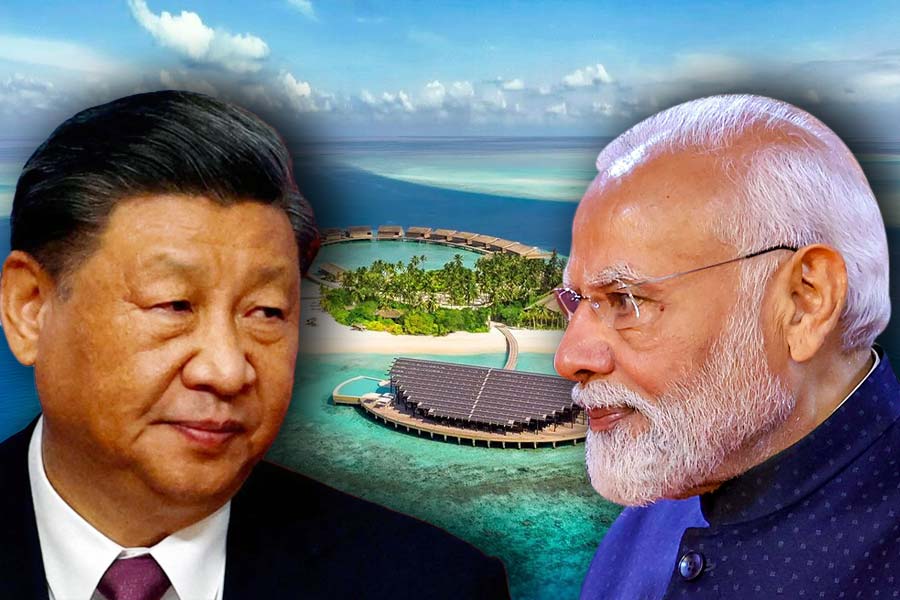News Desk, Kolkata :
The recent diplomatic interactions between China and India have sparked significant interest globally. During the five-day visit to China, Maldivian President Ibrahim Mohamed Solih met with Chinese President Xi Jinping, fostering a sense of camaraderie and emphasizing mutual support in safeguarding sovereignty in the Indo-Pacific region. This development comes at a time when geopolitical tensions have escalated between India and the Maldives, especially regarding their stance on the Indian Ocean.
On the third day of his visit to Beijing, President Solih held talks with President Xi Jinping, where the Chinese leader assured support for the Maldives in the face of recent conflicts with India. The Chinese state media, controlled by the Communist Party, highlighted the meeting, characterizing India as an “old friend and closest ally” during the discussions. The leaders signed several bilateral agreements, focusing on economic and trade cooperation between the two nations.
In the backdrop of these diplomatic maneuvers, it’s noteworthy that China has been strategically engaging with the Maldives, especially since President Solih, perceived as a “pro-China” leader, took office. The Maldives, traditionally leaning towards India, has experienced a shift in its foreign policy under President Solih, raising concerns in New Delhi.
The Chinese President’s assertion of “Indian influence” in South Asia during the talks indicates China’s proactive approach in the region, challenging India’s dominance. Jinping’s statements echo China’s consistent efforts to expand its influence, not only in the Indian Ocean but globally.
The Maldives, often dubbed the “pearl in the Indian Ocean,” has become a focal point in this geopolitical chessboard. President Solih’s visit to China and the subsequent positive rhetoric from both leaders signal China’s deepening engagement in the region, posing challenges for India’s strategic interests.
Adding to the complexity, the Maldives has recently witnessed internal political tensions. The opposition parties in the Maldives, aligning themselves with China, have been critical of President Solih’s administration. The President’s opponents accuse him of being too pro-India and have called for his removal from office. This internal strife further complicates the geopolitical dynamics in the region.
The backdrop of the India-China-Maldives triangle also draws attention to the broader geopolitical landscape. The Quad, a strategic alliance between the United States, Japan, Australia, and India, aimed at countering China’s influence, plays a crucial role. However, the recent developments indicate that China is actively challenging this alliance, seeking to strengthen its foothold in the Indian Ocean through diplomatic and economic means.
President Solih’s balancing act between India and China has intensified debates within the Maldives, with opposition leaders pushing for a more China-friendly foreign policy. This shift is not only reflected in diplomatic engagements but also resonates in the Maldivian society, with anti-India sentiments gaining traction.
As the geopolitical chessboard continues to evolve, the Maldives finds itself at the center of a delicate diplomatic dance. The Indian Ocean becomes the stage for a power struggle between regional giants, with the Maldives navigating through the complexities to safeguard its interests.
In conclusion, the recent developments in the China-Maldives relationship, coupled with India’s concerns and the internal dynamics within the Maldives, underscore the intricate geopolitical game unfolding in the Indian Ocean. The strategic moves by China, the responses from India, and the domestic political dynamics in the Maldives collectively shape the evolving narrative in this critical region. The story serves as a reminder of the geopolitical complexities that nations navigate and the delicate balance they must strike to safeguard their interests in an ever-changing world.
DISCLAIMER
Our news media denounces any form of bias and disapproves of sensationalism. The disseminated news is entirely educational and aimed at social awareness. Our media maintains absolute impartiality, adhering solely to the purpose of education and social consciousness.


